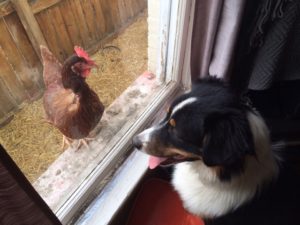6 Reasons Why Backyard Chicken Keeping is Awesome


1) Chickens Lay Eggs. Not just any eggs, but the most flavorful eggs you will ever eat. The recent health benefits from the U.S Department of Agriculture (USDA) nutrient date suggests that eggs from hens on a pasture may contain: 1⁄3 less cholesterol, 1⁄4 less saturated fat, 2⁄3 more Vitamin A, 2 times more Omega-3 fatty acids, 3 times more vitamin E, and 7 times more beta carotene.
2) Chickens don’t require a great deal of space. One should allow for 4 square feet of space per hen in their house and 10 square feet of space in an outdoor run.
3) Chickens are easy to care for. Chickens need food and water and safe exercise space. It takes a few minutes to feed them, collect eggs and clean up bedding.
4) Chickens are fun and educational for children. Children can experience firsthand where food comes from and learn how to be responsible with care and feeding.
5) Chickens produce manure, which is an ideal fertilizer for flower and vegetable gardens. Chicken manure provides more nitrogen, phosphorus and potassium to plants than horse or cow manure. Note: chicken manure is too strong to be used raw on your flowers or vegetables, but it can be composted and converted to “black gold”.
6) Chickens are an all-in-one yard service, resolving most insect and weed problems. If you have a section of yard with problems – forget the pesticide and let them scratch it up. Within a couple of days, it’s tilled and ready for planting.
Local ordinances for urban chicken farming in Colorado vary considerably. Currently, backyard chickens are allowed in Alamosa, Arvada, Boulder, Denver, Colorado, Springs, Greeley, Longmont, and most recently, Aurora. You will need to investigate in your city to determine local ordinances. There is a $50 fee for urban chicken farming in Denver. You may only have chickens and hens; no roosters.
Talk with your neighbors and make sure they are comfortable with your backyard flock. Make sure your chickens have a safe coop, as many Colorado areas have predators, such as foxes, raccoons, and coyotes. Without a protective roof, they could even be prey for hawks.





